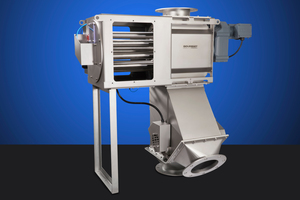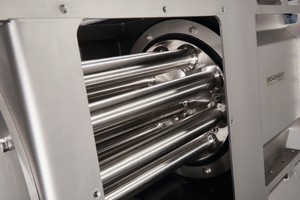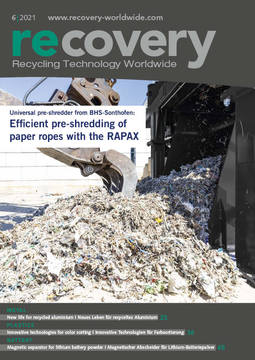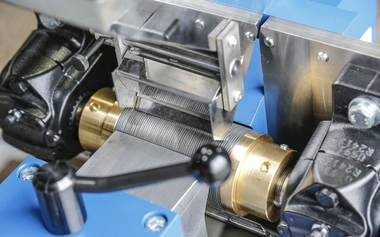Magnetic separator for lithium battery powder
Lithium is extracted from salt lakes such as the Salar de Atacama in Chile, where there are huge reserves of brine containing lithium. Some large producers process this lithium into a powder that serves as a raw material for batteries used in electric cars, laptops and mobile phones, among other things.
Goudsmit Magnetics of Waalre/the Netherlands has recently produced a rotating magnetic separator intended for the metal-free processing of lithium-ion powder intended for batteries. The quality of cathode powders such as nickel, cadmium and lithium must be optimal to guarantee the operation of a battery. Any metal contamination present in the powder reduces the quality of the material mix and leads to a battery‘s short life. The automatic cleaning rotating magnetic separator filters metal particles as small as 30 μm from the poorly flowing lithium powder.
The magnetic separator contains nine strong, rotating magnetic bars that prevent the fine powder from sticking to the bars like a bridge. The rotating movement ensures that the product does not block on the bars, so that good deferrization is possible. The contact with the magnetic bars is therefore optimal. This is important because weakly magnetic particles in particular must touch the magnetic bars. The pneumatically operated magnetic bars of Ø 50 mm have a deep catch field. With a flux density of 12 000 gauss on the bars, the magnet can capture paramagnetic particles such as iron oxide and stainless steel in addition to iron particles. The magnetic separator is dust-proof and can be cleaned automatically. The valve box in the system removes the captured metal particles on site.
The increasing demand for batteries for laptops, telephones and electric cars, for example, is driving up the price of raw materials extractable from mines. This applies to substances such as nickel, cadmium and lithium – the cathode powders – as well as to anode powders such as graphite, carbon black or silica. Magnets play an important role in the final development of lithium batteries, both in the extraction and production phases. The quality of a lithium ion battery depends on the purity of the raw material. Magnets are also necessary for the recycling of such batteries.




